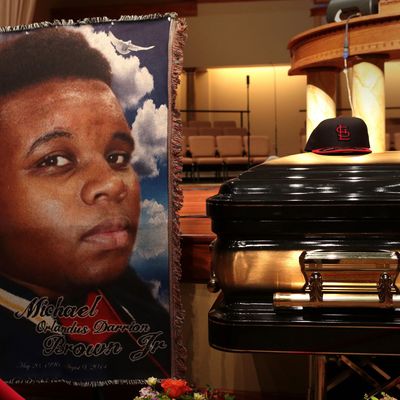
A new documentary about the death of 18-year-old Michael Brown at the hands of a Ferguson, Missouri, police officer contains previously unreported security footage which, according to the filmmaker and Brown’s family, complicates the police narrative about Brown’s final moments. Though the new footage does not pertain to the shooting itself, they claim it demonstrates that the black teenager did not, as Ferguson police had claimed, rob a convenience store in the minutes before he was confronted and killed by officer Darren Wilson on August 9, 2014.
After Brown’s death, police had released security footage, taken minutes before Brown encountered Wilson, from a nearby convenience store that shows the teen assaulting a store employee and taking packages of cigarillos. Per the New York Times, the new documentary Stranger Fruit, which premiered on Saturday at the SXSW festival in Austin, Texas, releases new security footage from the same store that the film uses as evidence to contend that Brown had already paid for the cigarillos the previous evening via a trade.
The new footage, recorded at around 1 a.m. on August 9 — about 11 hours before Brown’s fatal encounter with Wilson — shows the teen giving something to employees at the store, which Stranger Fruit filmmaker Jason Pollock contends was a small bag of marijuana. In the video, the store clerks are seen inspecting and smelling the bag. They then put two boxes of cigarillos in a bag and hand them to Brown, who walks away, then quickly returns and hands the bag back to the clerks, who put it behind the counter. It seems, from the video, that Brown and the store employees may have known each other. Pollack and Brown’s mother assert that Brown had in fact traded some weed for the cigarillos, then had the store employees hold them for him. When Brown returned later that day, they argue, he was simply attempting to pick them up from a different employee.
A lawyer for the convenience store, Jay Kanzler, disputes this claim to the Times, saying that, “There was no understanding [between Brown and the clerks]. No agreement. Those folks didn’t sell him cigarillos for pot. The reason he gave it back is he was walking out the door with unpaid merchandise and they wanted it back.”
Around 12 p.m. on August 9, Brown and a friend were recorded returning to the store, and that footage shows Brown shoving a clerk and taking cigarillos. Wilson, who said he was notified by police dispatch of the store robbery and descriptions of the suspects, then confronted Brown and his friend nearby. That’s when the controversial shooting happened.
Pollack, who works with filmmaker Michael Moore, sought out the video after reading a minor comment about it in a police report. He speculates that the police only released the second video because they wanted to destroy Brown’s character after his death, and not releasing the earlier video “shows their intention to make [Brown] look bad” and indicates a “suppression of evidence.” A spokesperson for the St. Louis County Police told the Times that they did not release the earlier video because they did not believe it was relevant to the investigation into the shooting.
Wilson, who claimed he shot Brown in self defense, was eventually cleared of wrongdoing in the case by both a grand jury and federal investigators, but Brown’s death — which was widely perceived to be racially motivated — and the large-scale Ferguson protests which followed it, became one of the key events leading to the rise of the Black Lives Matter movement and an important national debate about police violence, profiling, and criminal justice.
Brown’s parents have filed a federal civil suit against Wilson and the city of Ferguson over the death of their son.






























